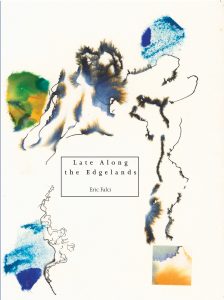Book Review
In Late Along the Edgelands, Eric Falci’s poetry is one of risk and refuge, sight and concealment, growth and slow extermination. The ecological concerns of the work meld with its formal and aesthetic framework, building and crumbling in concert with the world that it conveys. The incisive lyric here, like Falci’s nest-making wren, “alternates song and materials.”
Throughout the book, in this project of melding sound and subject, each poem asks its reader to consider the given word’s inscape. Indeed, a foremost engine of Late Along the Edgelands is something akin to the Hopkinsian instress—Falci trusts the objects of his attention to illuminate the path forward, for signs and directives to be inscribed in the words themselves. As he offers in the collection’s opening poem, “Five Phantoms, Five Stones”:
The flooded quarry
Is webbed in silvery
Cores. Sunk machines
Tug into the new
Lake bed. Its once
Street of ore. Remote
Site. Rumored, moored.
Admission was a room
Of sly marks. Plumb-
Lines of shale down-
Stroking like a seam
Of sea-light in the blue.
In our elemental attention to the quarry, Falci’s words themselves carry as if through bright seams—the elemental sound of “remote” advances us into “rumored,” then “moored,” containing in it the reversed “room” to follow. Rather than a poetics wherein the poet imposes their vision on the tools and materials with which they work, one can feel that Falci’s foremost purpose in Late Along the Edgelands is to listen.
In that act of listening, the poet seeks out settings ecotonal, ones at the margins, ones in transit or transformation, ones in which human voices echo but scarcely speak. The poet writes,
Just as the torn-through
Stone repeats its core
Over distances,
Let the lighthouse repeat
Its gibbous sweep
Over the Kill Van Kull
Half of radium, its rock
Collects each day the water’s
Toxic. From every flickered
Object future loss.
Human objects pervade and pervert the nonhuman world. As Mircea Eliade offers in The Myth of the Eternal Return, “Objects or acts acquire a value, and in so doing become real, because they participate, after one fashion or another, in a reality that transcends them. Among countless stones, one stone becomes sacred.” One stone becomes sacred, another profane. The pedestal on which people have placed the “natural” world has reinforced the creation of ecological abscesses—and so left these “edgelands” to which our attention seldom turns. So enters Falci’s quarry, his airport tarmac and terminal, his fetid New York estuaries—spaces and moments of environmental destruction that, per the poet, were “Forecast years before / And overlooked as fast.”
Among the many motifs and mechanisms at the poet’s disposal, anthropomorphism features often, as does a general muddying of boundaries between its human and nonhuman subjects. One feels, as the project proceeds, the deep necessity of these gestures, as well as the ethics that underpin them. To avoid the pathetic fallacy in this ecological moment, it may be, would be to ignore the central truth that humans have inflicted themselves on the “natural” world—the eye considering its surroundings must do so honestly, with human footprints trampled throughout. From “Disparition”:
The edgelands are midden: run your finger
Down a gone spine.
Or, in a reversal of this gesture, from “As Fog into Gravel”:
Revise the figure from the beginning,
Strewn among gods and rain, counting
The storm’s noise. It will keep with you
And can repair the ceiling’s loosening shore.
Ever, the body risked is one dissolving, while the body through which the reader sees is, itself, nearly altogether dissolved. Those moments in which Falci’s own voice and persona peek through the pages, however, sing all the brighter—in these bits of self-reflection, the poet considers his own hand, the limits of his eyes and voice in the curation of these collected words. Closing a series of couplets as one might a ghazal, the poet writes:
It’s all makeshift happening now
Among all that is gone. Just fuck you Eric. Seasons disperse
And the breeze off the bay nearly no longer arrives.
Beneath each of these individual gestures, one feels the project’s ethic at work. Each segment constitutes a clear and precise vision at its most vital, documenting the world through an unflinching lens. Perhaps more shaking than the poet’s picture of the present—brilliant and terrible though it is—is Falci’s shared picture of the ecological collapse yet to come. In “After No Lands,” he writes:
In a mid-ocean patch, the fluke prints
Encumber forests, encumber trash;
As the run on sour crude wanes,
scrap repeatedly transfers
From port to sun-struck port.
Late Along the Edgelands knows that the elegy is, among other things, a song of praise. Here, the insightful book praises bodies passed and bodies passing, mourns the distance between what they are and what they ought to be. In Falci’s pages, colonies of butterflies, our “Cardiograms / Of travel,” still trace their “million parabolas of air”; the bay winds still “pull fence-slats / From their place”; and still the sun lingers, “Fringed at the edge of the world; the empty, early dark.”
About the Reviewer
Daniel Schonning’s poems and essays have appeared or are forthcoming in Poetry Magazine, Guesthouse, Speculative Nonfiction, Sycamore Review, Seneca Review, and elsewhere. An associate editor at Colorado Review, he studies and teaches in Fort Collins, Colorado, where he is currently working on a book of abecedarians.
